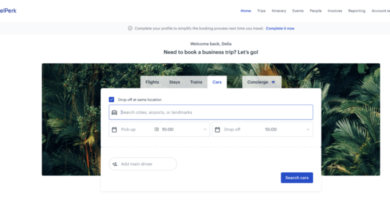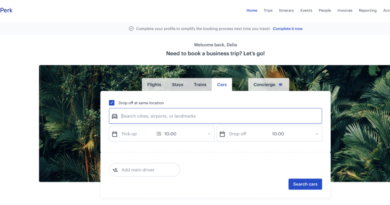Traveling for meetings: what you need to know
Domestic and international business travel can open many doors to developing new corporate partnerships and expanding your network.
While virtual meetings and webinars have become commonplace since the pandemic, in-person business meetings allow you to make stronger connections and build trust more easily with colleagues and clients.
Traveling to another culture can also offer employees different perspectives and the chance to return to the office with innovative ideas or previously elusive solutions.
However, we all know business trips can be challenging! Before you even embark on your journey, there are pitfalls and large amounts of planning to overcome. We have all fallen foul of overwhelming weeks trying to prepare a stand-out presentation while panic-packing those last-minute items.
Whether you’re heading to Europe or Utah, we’ll give you the lowdown on how to best ensure your business travel is as productive and stress-free as possible. Let’s dive in!
Research reduces risk!
Before you set off, it’s important to research your destination to avoid as many surprises as possible! Remember to look up the weather forecast to pack appropriately and prevent mistakes like planning a spectacular outdoor event during the rainy season!
Brush up on local customs
If you’re going overseas, ensure you understand the local culture so you can follow the appropriate customs. While a handshake is a common American greeting, business etiquette varies between countries.
For example, in Japan, a subtle bow is a respected greeting, and handshaking happens less frequently, so ensure you follow your Japanese host’s lead to get meetings off to a good start. It can also be helpful to learn some simple phrases in your host country’s native language if it’s different from your own.
Be prepared
It’s always worth allowing some extra time to navigate a new city, especially if you’re using public transport. Double-check meeting times and locations, and ensure you’re aware of any planned transport disruptions like train strikes or road closures so you’re not rushing to that important meeting! Another tip is to save your client’s phone number before corporate meetings. If you face delays, you can contact them quickly without searching through emails or documents first.
Business trips are often jam-packed! To avoid wasting time, set a clear agenda for the trip and meetings in advance so you and the other participants can focus on your organization’s top priorities. Finally, when prepping to impress, study the names and roles of everyone you will meet so you direct questions to the most relevant person.
Pack only the essentials
Generally speaking, packing lighter is better, particularly for business travel. You’ll save time not waiting for checked luggage to make its way off the plane, and you won’t have to drag heavy bags to that last meeting before dashing to the airport! However, efficient packing does take some preparation.
Generally, it’s best to choose clothes that can be layered if the weather is changeable while you’re away. If you’re attending a corporate event, check whether there are any dress codes to avoid any embarrassment!
Check whether your company cards will work overseas and if the charges and exchange rates align with your company’s travel policy. If you need an alternative, look into prepaid travel cards, which can be loaded to cover your travel spend before departure and topped up if necessary using a mobile app.
Finally, double-check what voltage and plug type is used in your destination and pack enough adapters to keep all your gadgets powered up! A travel adapter with USB ports can be worth sourcing so you can charge all your devices at the same time.
Navigating airports and ground transportation
Some airports are the size of small cities, and it can be easy to get lost! When creating an itinerary, factor this into your travel time and allow for lengthy immigration queues!

Serving over 5 million passengers a month, you’ll need 3-4 hours to comfortably transfer through Singapore’s expansive Changi Airport.
When you reach your destination, taking public transport rather than relying on private cars or taxis might be more convenient. Download local maps and public transport apps before you arrive so they’re available offline if you don’t have data or access to Wi-Fi. As a backup, install a local rideshare app to nip from A to B if your bus lets you down.
Assess your accommodation options
Several factors can come into play when deciding on the best accommodation for your business trip. Where your meetings are taking place will influence which area you need to be located or have reliable transport links to.
If you’re traveling individually, hotel rooms are likely your best option. In contrast, Airbnb can be more affordable and practical for group travel. However, this is always true! In certain cities, booking an Airbnb is often cheaper than a hotel, regardless of party size. If you want to know more about how Airbnb rates for business trips, check out our comprehensive guide on using Airbnb for corporate travel.

New York is just one example of a destination where Airbnb is often more cost effective than a traditional hotel stay.
With so many options and things to consider, it can be simpler to let a full-service travel agency or travel management company (TMC) take care of arrangements for you. TravelPerk is a corporate TMC with an extensive accommodation inventory and access to industry-leading corporate rates. Plus, users can access a range of corporate travel solutions and 24/7 customer support.
Stay productive with SaaS
Being able to access your work systems remotely can help you stay productive and manage your time effectively while on the move. A wide range of SaaS tools are available, from Trello and Asana to organize to-do lists, Slack and Microsoft Teams to keep connected, and Google Drive and Dropbox to ensure easy access to documents.
Plan for peace of mind
Travel insurance is an important aspect of your company’s duty of care for business trips. Policies can include coverage for lost luggage, cancellations, and healthcare emergencies, so check which inclusions you have in your travel policy for reassurance on the road.
For further peace of mind, TravelPerk’s travel risk management solution, TravelCare, can keep you informed and supported before and during business trips. Users receive real-time notifications about any health and safety risks relevant to their destination, and a dedicated customer care team is available 24/7 for assistance.

Save time to explore
When your meetings are over, ensure you factor in some downtime while you’re away. Remember to give yourself time to relax, not only for your well-being but also to soak up your destination for inspiration.
34% of surveyed workers believe their most creative ideas have come while traveling for work, a stat that jumps to 53% for employees aged 16-24 (TravelPerk).
Eating healthily, keeping hydrated, and frequent rest can also help you feel energized and ready to tackle next quarter’s challenges on your return!




